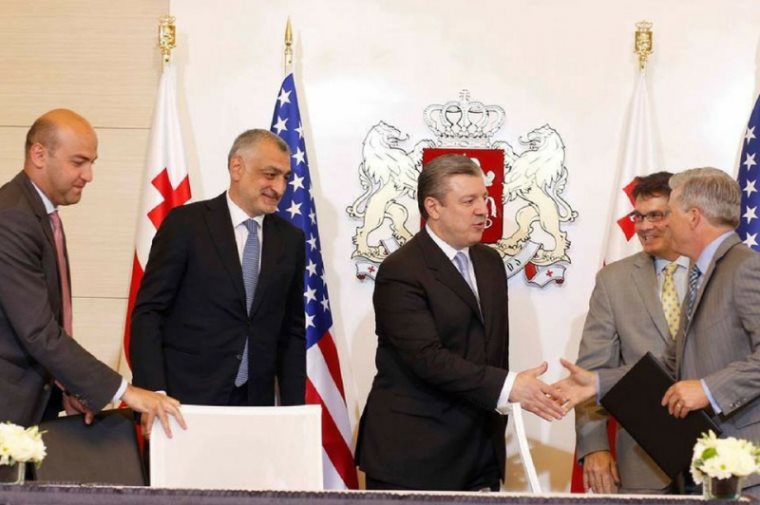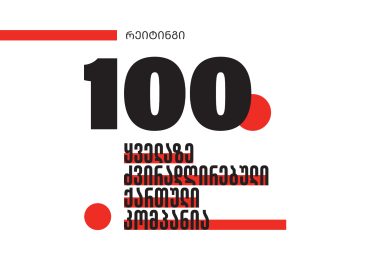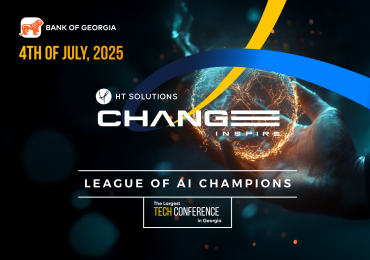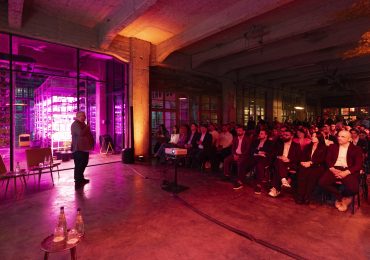After Conti International, SSA Marine is the second US company to become a strategic investor for the Anaklia Port project. The project was cited by the US Vice-president Mike Pence as one the key projects for the economic development of Georgia and also, for the further development of US-Georgia business ties.
The Port of Anaklia sits on the shortest route from China to Europe, a route that has become a major focal point of Chinese investments in infrastructure. As such, the port will attract high-value cargos seeking the fastest travel between Chinese and European Markets. This cargo represents significant upside for the port and will create robust returns for shareholders. In addition to Anaklia being a geographically ideal location for port development, the city is the last technically feasible location for a new deep sea port in Georgia.
SSA Marine is one of the largest terminal operators in the world and is headquartered in Seattle, United States. The company oversees more than 250 strategic operations across five continents, servicing 27.2 million containers (TEU) and managing terminals in nine different countries. In addition, SSA Marine handles over 75 million tonnes of dry bulk globally, manages cruise ship operations in Mexico and the United States and operates over 30 intermodal rail ramps for U.S. Class I railroads.
What is the role of his company in the development of Anaklia project and what is the role of Anaklia project in the development of whole economy – these were just a part of questions that Forbes Georgia asked the vice president of SSA Marine. Robert Waters sat down for an interview with Georgia’s most influential business edition.
Mr. Waters, thank you for your time. First of all, SSA Marine has become an investor company of Anaklia project. What does this mean and what will be your specific involvement in this project?
Our involvement will be on different levels. We will be the operator of the terminal. Obviously, equity investor and shareholder and a member of strategic shareholder’s board who will help to develop the project.
What led to this decision of you to be involved in this project as a shareholder?
We are not a passive investor. We are strategic investors where we operate and where we see very good commercial opportunities. So in this particular project, we like the potential for growth. We see potential for handling not only Georgian cargos, which will be important, but all cargos along the whole southern corridor – all the way to Central Asian corridor. We see there a very large opportunity. That coupled with the situation in Georgia now, in terms of continued economic growth – we have done our analysis and we see that there is a very strong market and with the reforms government is generating – in our mind it makes very attractive for business growth as well as for drawing foreign direct investment.
I’ve read in many of your interviews that you have called this project perspective and ambitious project – what do you mean?
It’s ambitious because of the scale of the project. Nine different phases over time. The growth going from 8 million TEU to 100 million TEU – that’s an ambitious goal. One that I think can be achieved over the time-frame that it’s looking at. But obviously that kind of growth is pretty dramatic. We think it’s achievable but again anytime people are looking at this – it’s ambitious growth. And we like that. That’s encouraging to us to see that’s what government wants to do rather than somebody looking at only at two-three-four year perspective. We like to see long-term planning. We are a private company owned by two families and we look at things from the generation standpoint and not from the short-term standpoint. We like the idea that the government views this project as an ambitious project and looking at it multi 20-25 years.
What makes you think that Anaklia has this potential of becoming a regional trade hub?
One of the reasons is because there are so many land lock countries. When you are talking about Azerbaijan, Armenia, Turkmenistan – they need an outlet to import and export cargos be it manufacturing or export – they need to have some sort of opportunity to move it off shore. That’s the Black Sea of course. The best place for them to do that on the black sea is through Georgia. The best place in Georgia to do that is Anaklia because it’s the deep water port and has the ability to handle large ships which makes the economy of scale more attractive for the shipper. So if you start to line up all the dominos you can see how it links to one another. It’s totally inter-related. And shows that this is the place for the big hub for the land locked countries and not just for Georgian cargo.
Since we are talking about competitive advantages: Anaklia Port’s mission is to create a new, faster maritime corridor between China and Europe toward the historic Silk Road – this is what we have read in several releases about Anaklia Port – so can we say that the speed is one of the competitive advantages of the Port?
There are several competitive advantages: Speed will be one certainly – in terms of ship operation. When you look at the speed you have to look at whole transit corridor. We are only able to operate and manage port itself: from the port standpoint being able to design the facility, like we are doing now and equip it with modern technology – being in a position versus Poti for example, that is much more productive and much more cost effective from a customers’ standpoint and from anybody that is a cargo owner to move through because we will be able to move much bigger ships. There is economy of scale with much bigger ships because we have a deeper channel at 16 meters and also because of the types of equipment we can have in terms of the way it is designed and equipped that we can turn those vessels much faster with much higher productivity for each piece of container that we move – so in all aspects it’s much higher productivity and much more cost-effective.
Can we talk more broadly what determines in general logistics performance?
I think we already mentioned that in terms of Anaklia Port – in terms of design and equipment, channel and automatic terminal operation systems. But then on top of that next most important piece would be the railroad and how the railroad is able to supply cargo to the facility and cargo off of the facility, and move that into rest of Georgia and into the central Asian countries. So that’s really is as critical as anything – I mean we can control what happens at terminal: We can make that work as a state of art facility but you also need to have that operation complemented by a strong supporting railroad system to move as much cargo – if you want to get to 100 million tons a year you need to have a very effective rail systems supporting that.
And do you have now cooperation with Georgian Rail and government for guarantees that this will happen?
The government has made that commitment to us – both Prime Minister’s office and Georgia Rail have made commitments to us that they will provide the kinds of systems to make that happen. So we have high level confidence that this will happen.
So if I understand the railway and the Port itself they won’t be competing for cargos.
They will be complimentary – when we handle more cargo, more cargo will go on the rail. So the rail will be more effective and more productive. And as the railroad becomes more effective and increases its capacity that brings more cargo to the terminal. So they will be complimentary.
Some good win-win position there… I’d like to mention World Bank’s Logistics Performance Index – probably you are aware of that index – it says that supply chain reliability matters the most, meaning that many shippers are even willing to pay a premium if they know exactly that their cargo gets to the point on time – so how do you assess Anaklia Port’s chances in this respect, considering all the risks that the region itself has?
This operation will be world class: It is as effective and productive as any terminal in the world. From that standpoint what we do provide – and if you look at SSA’s reputation anywhere in the world we do provide those kinds of productivity, considerations and commitments to the customers so that their cargo does get to the point. One of the problems right now is at Poti, they don’t have that. They don’t have that confidence and timing that goes through because Poti is closed for the most of the time because of the high winds or saltation as the draft goes away. So when you have that, there’s nothing – the reliability isn’t there. As you mentioned reliability is extremely important to people who are moving the cargo or selling the cargo either export or import way. This will help in a dramatic fashion to provide that confidence to the shippers in terms of moving their cargo on efficient and timely basis.
So, who will be main competitors of Anaklia Port?
Well, I don’t really think that we will have any competitors.
So easy…
You can look at it at a very narrow basis or you can look at it at much grander basis. If you look at it on a much grander basis any cargos moving from the Central Asian countries will be going through one of two or three different corridors. Either the Southern Corridor coming through Georgia and likely through Anaklia, or going North through Novorosiisk or something like that. So if you are looking and Central Asian cargo, those will be the competitors. If you are looking a Georgian cargo, that is origin or destined to Georgia, then you will be more looking at Batumi or Poti as more regional competitions. On a grander scale you will be looking at maybe even rail coming through Turkey or Novorosiisk to North Corridor.
Can we speak broadly about Anaklia project including all the other pieces like Anaklia City, Free Industrial Zone and all the other aspects of the whole picture – and how it will be complimentary to what you are specifically in charge of?
From an economic standpoint the Port will be very beneficial to Anaklia city. Generally when you have ports like this they are an economic engine. They drive economies you are bringing in more business you are bringing in good family wage jobs – so you are generating more jobs there . Generally when you see a situation like this as a result of having an efficient and cost-effective port in an area like this then you see a free-trade zone, you see more manufacturing – it starts to snow ball: tracking more and more investments. If you couple that with what the government has done to do free trade agreements with the China and free trade agreements with the EU – it’s a very good location then to bring in more manufacturing and foreign direct investment through manufacturing because they can take advantages of the free trade agreements to Europe and China and have great access from transportation standpoint. So generally you see these kinds of things as a drive for an economic engine if you will, to help make it very prosperous and generate more jobs for regions like this – like Anaklia city.
Sine you mentioned jobs, do you find skilled workforce – local workforce in Georgia?
For the number of jobs that we will have initially and as the project grows the problem is that there are not that many people in Georgia to have those kinds of skills – so what we will do is we will hire local Georgian people and train them – so we will do that probably six to nine months to the actual start of the operations. We will train them in all aspects.
Since this is quite a long-term project does this mean that SSA Marine trusts in Georgia’s business environment and its stability over these years?
Absolutely. We wouldn’t be making investment otherwise.
You also mentioned reforms. What do you need from the government right now – what kind of support?
There’s nothing really else in terms of business fundamentals. We go to many places and what we see in Georgia as a platform for businesses and foreign direct investment is the best in the world. Again the government has told us it will make growth and improvements in Georgia rail over the years. This is critical. That’s what we could ask government once again. It is crucial for the port to make the whole process smooth and grow over time. If there is one thing this is one thing that we really need to have help from the government and I think we have that commitment.
To sum up, so what will Georgia gain out of your involvement in Anaklia Port’s project?
I think confidence. We’ve built number of green field projects so we have the proven track record that we can develop and work and operate these kinds of ports. So I think the government will realize that from our experience we want to translate that here, to Georgia to make sure that the project will be completed on time and operate on world class service level. And as we have shown in other projects we have the aptitude not only to start and initiate this but grow the project up to the scale that the government is talking about. A project in Panama for example: in 1995 125 thousand TEUs and 25 years later we’re doing now 2.5 million TEUs and it has enhanced free industrial zones and whole other parts have grown just like we anticipate here.
So what is the main challenge that you see with this project – how is it different from others that you have done and what is the main challenge?
Every project has different challenges. I think the biggest challenge here probably will be generating more awareness of the project: We will have to educate people in the Central Asian countries about features and benefits of this project – how it will work for them and how it will be more beneficial for them; so that we can make Georgia true transportation hub that it can be and should be. And I think that’s really matter of going out to market places and creating awareness for foreigners, for manufacturers, for the cargos so that they understand what benefits are and how to utilize that. It’s not a difficult job, it is time consuming. Once we get over that hurdle people will become more aware and they will see how the system works and how Georgia really is a strong transportation hub corridor then they will start to build on itself and have more corridor growing and more jobs flowing.
And probably you will be starting this from phase 1…
Absolutely. We are actually starting to do that this month.
Wonderful. Wish you great success and thank you.
Thank you very much.















